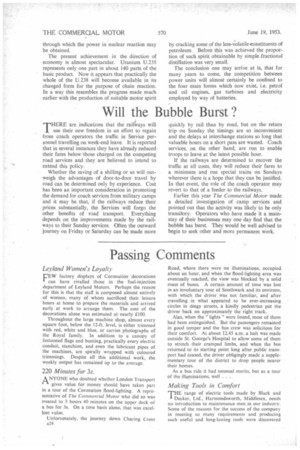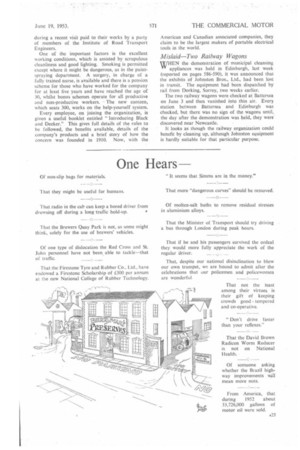Passing Comments
Page 26

Page 27

If you've noticed an error in this article please click here to report it so we can fix it.
Leyland Women's Loyalty
FEW factory displays of Coronation decorations can have rivalled those in the fuel-injection department of Leyland Motors. Perhaps the reason for this is that the staff is composed almost entirely of women, many of whom sacrificed their leisure hours at home to prepare the materials and arrived early at work to arrange them. The cost of the decorations alone was estimated at nearly £100.
Throughout the large machine shop, almost every square foot, below the 12-ft. level, is either trimmed with red, white and blue, or carries photographs of the Royal family. In addition to a canopy of festooned flags and bunting, practically every electric conduit, stanchion, and even the lubricant pipes of the machines, are spirally wrapped with coloured trimmings. Despite all this additional work, the weekly output has remained up to the average.
220 Minutes for 3s.
A NYONE who doubted whether London Transport 1-k gives value for money should have taken part in a tour of the Coronation flood-lighting. A representative of The Commerehti Motor who did so was treated to 3 hours 40 minutes on the upper deck of a bus for 3s. On a time basis alone, that was excellent value.
Unfortunately, the journey down Charing Cross A24 Road, where there were no illuminations, occupied about an hour, and when the flood-lighting area was eventually reached, the view was blocked by a solid mass of buses. A certain amount of time was lost in an involuntary tour of Southwark and its environs, with which the driver was not familiar, and after travelling in what appeared to be ever-increasing circles in dingy streets, a kindly pedestrian put the driver back on approximately the right track.
Alas, when the " lights" were found, most of them had been extinguished.. But the passengers remained in good temper and the bus crew was solicitous for their comfort. At about 12.45 am. a halt was made outside St. George's Hospital to allow some of them to stretch their cramped limbs, and when the bus returned to its starting point long after public transport had ceased, the driver obligingly made a supplementary tour of the district to drop people nearer their homes.
As a bus ride it had unusual merits, but as a tour of the illuminations, well . . .
Making Tools in Comfort
THE range -of electric tools made by Black and Decker, Ltd., Harmondsworth, Middlesex, needs no introduction to maintenance men, in our industry. Some of the reasons for the success of the company in meeting so many requirements and producing such useful and long-lasting tools were discovered
during a recent visit paid to their works by a party of members of the Institute of Road Transport Engineers.
One of the important factors is the excellent working conditions, which is assisted by scrupulous cleanliness and good lighting. Smoking is permitted except where it might be dangerous, as in the paintspraying department. A surgery, in charge of a fully trained nurse, is available and there is a pension scheme for those who have worked for the company for at least five years and have reached the age of 30, whilst bonus schemes operate for all productive and non-productive workers. The new canteen, which seats 300, works on the help-yourself system.
Every employee, on joining the organization, is given a useful booklet entitled "Introducing Black and Decker." This gives full details of the rules to be followed, the benefits available, details of the company's products and a brief story of how the concern was founded in 1910. Now, with the
American and Canadian associated companies, they claim to be the largest makers of portable electrical tools in the world.
Mislaid—Two Railway Wagons
WHEN the demonstration of municipal cleansing " appliances was held in Edinburgh, last week (reported on pages 586-590), it was announced that the exhibits of Johnston Bros., Ltd., had been lost in transit. The equipment had been dispatched by rail from Dorking, Surrey, two weeks earlier.
The two railway wagons were checked at Battersea on June 3 and then vanished into thin air. Every station between Battersea and Edinburgh was checked, but there was no sign of the wagons until,. the day after the demonstration was held, they were discovered near Newcastle.
It looks as though the railway organization could benefit by cleaning up, although Johnston equipment is hardly suitable for that particular purpose.




















































































